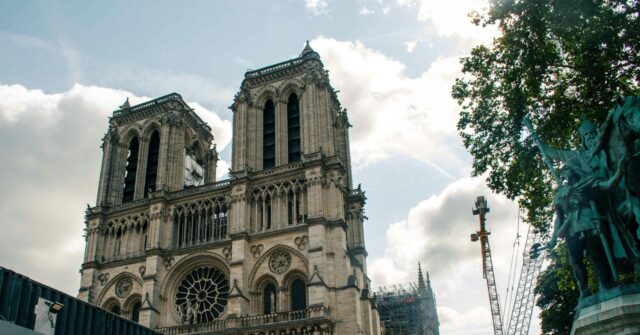In a recent initiative, France’s Culture Minister, Rachida Dati, has put forth a proposal to implement an entrance fee for visitors to the Notre Dame Cathedral, which is set to reopen in December after a five-year renovation period following a devastating fire in April 2019. The proposed fee of 5 euros (approximately $4.16) aims to generate approximately 75 million euros (around $62.41 million) annually, crucial for the preservation and restoration of France’s vast and often deteriorating religious heritage. Notre Dame, with its breathtaking architecture, including soaring ceilings and exquisite stained-glass windows, had previously attracted an impressive 12 to 14 million visitors each year, and this initiative is seen as a sustainable model for funding the maintenance of other religious sites across the country.
Dati emphasized the significance of the entrance fee during an interview with Le Figaro, suggesting that a nominal charge could substantially contribute to saving many religious structures throughout France. She noted that visitors across Europe commonly pay for entry to renowned religious sites, making the proposed fee not only practical but a potential symbol of commitment to heritage conservation. France boasts around 42,000 Catholic churches, many of which are in dire need of repair, with estimates indicating that a religious building succumbs to neglect or destruction every two weeks. The revenue generated from admissions at Notre Dame could play a vital role in reversing this concerning trend.
In light of the ongoing crisis concerning France’s religious buildings, the government has initiated several campaigns aimed at bolstering restoration efforts. One of those initiatives, known as the ‘Loto du patrimoine,’ has effectively funded significant restoration projects. In 2022, the Interior Ministry allocated 57 million euros for the restoration of religious heritage, and over the preceding five years, an investment of 280 million euros has helped restore more than 8,000 sites. Despite these efforts, many rural churches continue to face substantial risks, highlighting the urgent need for innovative funding solutions like the proposed entrance fee at Notre Dame.
Support for Dati’s proposal has emerged from different quarters, including Interior Minister Bruno Retailleau, who expressed that if a fee of 5 euros could genuinely assist in saving France’s religious heritage, then it is a worthwhile investment for everyone, regardless of religious belief. Dati clarified on social media platform X that the entrance fee would only apply to visitors attending cultural tours, ensuring that mass and other religious services would remain free, thus respecting the sanctity and accessibility of religious practice while addressing the financial needs of preservation.
Before the fire, Notre Dame had already charged an entry fee for visitors who wished to explore its iconic towers for a panoramic view of Paris. This precedent sets a foundation for introducing a similar model, and the expectation is that this fee will contribute to the cathedral’s restoration while also providing necessary funding for other religious sites across France. The initiative represents a forward-thinking approach towards cultural heritage and the responsibility of society to preserve its historical and spiritual landmarks.
Ultimately, the reopening of Notre Dame is not just a moment of nostalgia but a pivotal opportunity for renewal. The pressed urgency to fund restoration projects reflects a broader challenge facing France’s cultural and religious heritage. With public support and a structured funding system, such as entry fees, France can maintain its rich tradition of religious architecture and ensure that these historic sites are preserved for future generations. Dati’s proposal, if implemented, could mark a significant step towards safeguarding the collective cultural identity while encouraging active participation from both locals and tourists in the preservation of one of the world’s most cherished religious monuments.

